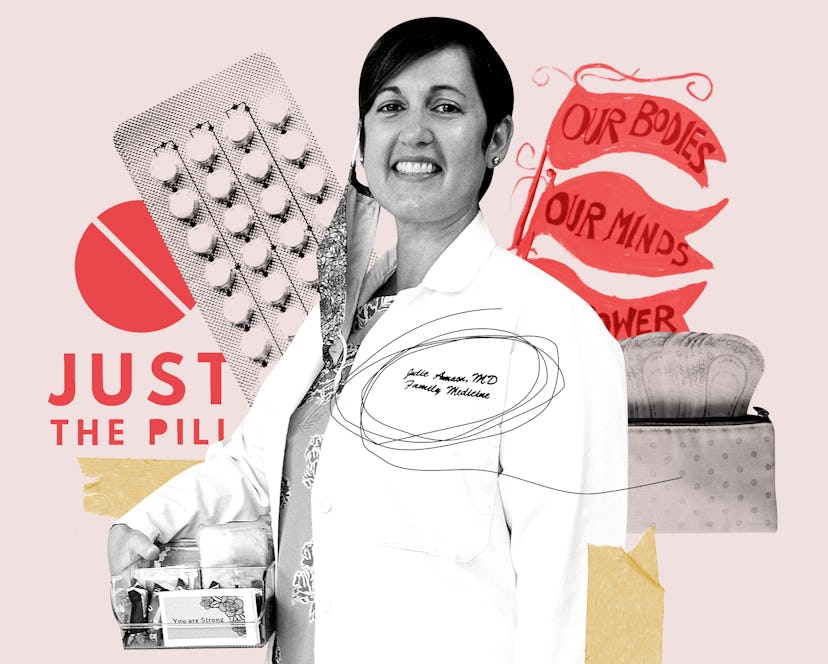Health
Why I Started Providing Medication Abortions During The Pandemic
Dr. Julie Amaon explains what a “perfect world” for reproductive health care looks like to her.

Dr. Julie Amaon, M.D., 43, is the medical director of Just the Pill, a mobile reproductive health clinic out of Minneapolis, Minnesota, which began mailing medication for abortion, birth control, and STI treatment this month. She graduated from her residency in family medicine during the COVID-19 pandemic and realized that, with clinics limiting their services and patients afraid to see a doctor over exposure concerns, no-touch, no-test medication abortion was critical health care that she could safely provide.
Amaon tells Bustle about how she became an abortion provider, and what reproductive health care would look like in a perfect world.
I started in the abortion care world not as a physician, but working in my local Planned Parenthood in Austin, Texas. This was right around the time when our state government took away most of our family planning money and gave it to crisis pregnancy centers. Over the next four years that I managed the clinic, things just kept getting worse for abortion access. I decided to go to medical school in 2012 to become a physician, so we could have more abortion providers in Texas.
My family medicine residency program at the University of Minnesota Medical Center trained everyone studying family medicine in abortion, and if someone wasn’t comfortable with that, they could opt out. It shouldn’t be something super unique, but there are only 38 Reproductive Health Education in Family Medicine (RHEDI)-funded opt-out programs in family medicine nationwide. [Even in OB-GYN residencies, many programs are either opt-in or don’t offer abortion training at all.]
In a perfect world, you could see a family medicine doctor for a sinus infection, for birth control, and for a medication abortion. That doctor could call the medicine in to your pharmacy or have it mailed to your home — whatever is best for you.
People drove 18 hours, from Texas to Minnesota, to get abortion care.
That’s not what’s happening now. Because of the FDA’s Risk Evaluation & Management Strategy (REMS) program, in order to provide medication abortion, you have to be registered as a provider, which means being on a publicly available list maintained by the drug manufacturer. This creates a lot of stigma among those who would want to offer medication abortion in a small town, as a family medicine doctor. In Minnesota, specifically, 97% of counties don’t have an abortion provider. The struggle here is very real. Most people will have to travel a long way to get an abortion.
That’s how the idea was born to have a mobile clinic. What if we could drive through the state with our clinic and then people could access medication abortion because we’ve come to them? We’ve been up and running for a week, and the response from our community has already been amazing. The reproductive health advocacy organizations we partner with are so excited that people in rural areas can now have access to abortion, regardless of whether or not they have a car or live in a county with a provider. I just sent our first medication abortion pill order from our mail-in pharmacy partner.
In July, an injunction lifted some REMS restrictions in light of the pandemic, so you can now mail mifepristone, the medication abortion pill, where before that was largely illegal. That means we can advertise in rural communities more than 100 miles away from our brick-and-mortar medical office, where we house medication abortion pills in case our ability to use mail-in pharmacies is revoked so that we can mail it out ourselves. It also means people can take their pills at home, which is wonderful.
Our plan is to target rural communities in the state because right now, people have to drive for hours to get their health care. I was in Minnesota when abortion clinics shut down in Texas because of COVID — people drove 18 hours, from Texas to Minnesota, to get abortion care. Even after the pandemic ends, we hope to have a mobile clinic so we can insert IUDs or the birth control implant Nexplanon and provide other forms of primary care.
As a family medicine physician, I love being able to take care of patients cradle to grave. If someone has an unwanted pregnancy, my hope for the future is that they can come to me, their trusted family medicine provider, and I can offer her all the options in my clinic or over video.
I shouldn’t have to say, ‘Well I don’t stock mifepristone here, so I have to send you somewhere else and to a doctor you don’t already know and trust.’ I envision healthcare differently than that.
This interview has been edited and condensed.